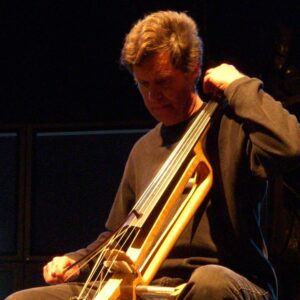The Quarantine at the Core of Our Hearts
Chris Chafe
Constantin Basica
Henrik von Coler
Fernando Lopez-Lezcano
Juan Parra
Klaus Scheuermann
Nolan Miranda
Cultural pessimists might argue that we’ve never lived in an age as isolated and atomized as this one, and a certain recent pandemic certainly didn’t help. Cultural optimists on the other hand might quote German poet Hölderlin: “But where the danger is, also grows the saving power.” Whatever the truth may be, the collective minds behind THE QUARANTINE AT THE CORE OF OUR HEARTS elegantly disregarded rumination, and instead chose to act.
At a time when government regulations prohibited concerts and rehearsals, these six international aficionados of electroacoustic composition decided that now was a good time to harness the powers of modern technology, and to get together for a virtual jam session. The result is an hour-long cerebral meditation on forced isolation – and its eventual overcoming.
Listen
Stream/Buy
Choose your platform
Track Listing & Credits
| # | Title | Composer | Performer | |
|---|---|---|---|---|
| 01 | Quarantine Sessions #87 | Nolan Miranda, Constantin Basica, Chris Chafe, Henrik von Coler, Fernando Lopez-Lezcano, Juan Parra, Klaus Scheuermann | 56:01 |
Guest performer
Nolan Miranda (Stanford CA)
The Core
Constantin Basica (Stanford CA)
Chris Chafe (Woodside CA)
Henrik von Coler (Berlin DE)
Fernando Lopez-Lezcano (San Carlos CA)
Juan Parra (Ghent BE)
Klaus Scheuermann (Berlin DE)
Quarantine Sessions, 2nd Anniversay Concert
Live Concert, Quarantine Session no. 87
The Quarantine Sessions are realized using free and open source technologies, which can be adopted by anyone:
JackTrip (audio)
Jitsi (video)
OBS (streaming)
Executive Producer Bob Lord
A&R Director Brandon MacNeil
A&R Quinton Blue
VP of Production Jan Košulič
Audio Director Lucas Paquette
VP, Design & Marketing Brett Picknell
Art Director Ryan Harrison
Design Edward A. Fleming
Publicity Patrick Niland, Aidan Curran
Artist Information

Chris Chafe
Chris Chafe is a composer, improvisor, and cellist, developing much of his music alongside computer-based research. He is Director of Stanford University's Center for Computer Research in Music and Acoustics (CCRMA). At IRCAM (Paris) and The Banff Centre (Alberta), he pursued methods for digital synthesis, music performance, and real-time internet collaboration. CCRMA's SoundWIRE project involves live concertizing with musicians the world over. Online collaboration software including jacktrip and research into latency factors continue to evolve. An active performer either on the net or physically present, his music reaches audiences in dozens of countries and sometimes at novel venues.
Nolan Miranda
Nolan Miranda is a fourth-year student in math, music technology, and computer science at Stanford University. His music interests include jazz, classical, other improvisatory music, analog and digital synthesizers, and computer music.
Constantin Basica
Constantin Basica is a Romanian composer living in the San Francisco Bay Area, whose current work focuses on symbiotic interrelations between music, video, and performers. His pieces have been featured at festivals and conferences such as MATA Festival (New York NY), the International Festival for Video Art and Visual Music (Mexico City MX), Currents New Media Festival (Santa Fe NM), the International Week for New Music and the InnerSound International Festival for New Arts (Bucharest RO), next_generation Festival at ZKM (Karlsruhe DE), the 2016 Sound and Music Computing Conference (Hamburg DE), and Aveiro_Síntese International Festival of Electroacoustic Music (Aveiro PT). He received the ICMA Award for Best Submission from Europe at the 2017 ICMC in Shanghai. Basica earned a DMA in Composition at Stanford University under the guidance of Jaroslaw Kapuscinski, Brian Ferneyhough, Mark Applebaum, and Erik Ulman. He holds an M.A. degree in Multimedia Composition from the Hamburg University of Music and Theatre and two B.A. degrees in Composition and Conducting from the National University of Music Bucharest. Currently, Basica is a postdoctoral scholar, lecturer, and the concert coordinator at Stanford’s Center for Computer Research in Music and Acoustics (CCRMA).
Henrik von Coler
Henrik von Coler is a musician and researcher in the field of electronic and electroacoustic music. He is currently working at Audio Communication Group, TU Berlin, where he is director of the Electronic Music Studio. In his compositions and performances he is focusing on the use of low-tech elements in state-of-the-art technical systems, combining vintage sound generation and erroneous systems with sound field synthesis systems. He is the founder of the Electronic Orchestra Charlottenburg, a group of 10 musicians performing live electronic music with modular synthesizers and other instruments on large loudspeaker setups.
Fernando Lopez-Lezcano
Fernando Lopez-Lezcano enjoys imagining and building things, fixing them when they don’t work, and improving them even if they seem to work just fine. The scope of the word “things” is very wide, and includes computer hardware and software, controllers, music composition, performance, and sound. His music blurs the line between technology and art, and is as much about form and sound processing, synthesis and spatialization, as about algorithms and custom software he writes for each piece. He has been working in multichannel sound and diffusion techniques for a long time, and can hack Linux for a living. At CCRMA, Stanford University since 1993, he combines his backgrounds in music (piano and composition), electronic engineering, and programming with his love of teaching and music composition and performance. He discovered the intimate workings of sound while building his own analog synthesizers a very very long time ago, and even after more than 30 years, “El Dinosaurio” is still being used in live performances. He was the Edgar Varese Guest Professor at TU Berlin during the Summer of 2008. In 2014 he received the Marsh O’Neill Award For Exceptional and Enduring Support of Stanford University’s Research Enterprise.
Juan Parra
Juan Parra Cancino studied Composition at the Catholic University of Chile and Sonology at The Royal Conservatoire The Hague (NL), where he obtained his Masters Degree with focus on Composition and Performance of Electronic Music. In 2014, Cancino obtained his Ph.D. from Leiden University with his thesis “Multiple Paths: Towards a Performance practice in Computer Music”. His compositions have been performed in Europe, Japan, North and South America in festivals such as ICMC, “Sonorities,” “Synthese,” and “November Music,” among many others. His acousmatic piece Serenata a Bruno obtained a special mention at the Bourges electroacoustic music competition of 2003 and in 2004, his piece Tellura was awarded with the residence prize of the same competition. Founder of The Electronic Hammer, a computer and percussion trio, and Wiregriot (voice & electronics), he collaborates regularly with Ensemble KLANG (NL) and Hermes (BE), among many others. His work in the field of live electronic music has made him recipient of numerous grants such as NFPK, Prins Bernhard Cultuurfonds, and the International Music Council. Since 2009 Cancino has been a fellow researcher at the Orpheus Institute (Ghent BE), focused on performance practice in Computer Music.
Klaus Scheuermann
Trummerschlunk performs slow techno that immerses into a modular synthesizer-driven soundscape and invites a sci-fi inspired journey toward big questions and amorphous feelings. In real life, Klaus Scheuermann is a Berlin based mix and mastering engineer with almost 20 years of experience in jazz and electronic music.
Notes
The Coronavirus Crisis has changed our lives and we are in the midst of a long period without concerts as we knew them. In addition to the problem of large audiences, the regulations also make it ‘virtually’ impossible for musicians to get together, to rehearse, or perform. However, many technologies and solutions are already available, helping us to find new ways of collaborating and transporting our work to audiences. We have been programming, testing, and rehearsing in an online environment between California, Berlin, and Ghent. We present concerts that connect musicians from these locations and sometimes guests from other places to each other. The sessions are broadcast live with audio and video feeds from each site.
—Henrik von Coler

